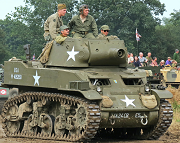|
Slim Jim Pickens posted:If you think the Japanese merchant marine got a raw deal, just remember that a whole third of the Italy's cargo ships were seized in foreign ports because Mussolini never told them he was declaring war. Was there any part of italy's WW2 performance that wasn't in some way a total clusterfuck?
|
|
|
|

|
| # ? Jun 6, 2024 00:07 |
|
spectralent posted:Was there any part of italy's WW2 performance that wasn't in some way a total clusterfuck? The Italian partisans.  e: vvvv Oh, yeah, that too. my dad fucked around with this message at 22:55 on Jun 4, 2016 |
|
|
|
naval special ops, ask SEXMAN for details
|
|
|
|
Nebakenezzer posted:I'm looking for the Life article speculating on a Japanese Invasion of Alaska and the subsequent land battles in Canada and the Western US. In the meantime, have the biggest font you will ever hopefully see: This is fantastic. It's especially interesting noting the emphasis on battleships as the key to victory in the article, with a lot of discussion about how the US Navy's task now was to keep the Pacific Fleet (that is, the battleships) intact until the Atlantic fleet can reinforce with their battleships, thus gaining numerical superiority at which point they'd steam out to smash the hell out of the Japanese battleships, while the Japanese battleships would conversely be trying to engage the US battleships while they were still divided (this being Japan's "supreme and perhaps last chance" at victory). Carriers are only mentioned in passing as part of the treacherous Japanese sneak attack, though they do take care to say of the Kaga that "the skill of its crew is far surpassed by US carrier technique." Question for the thread, when did the general public first start becoming aware that carriers were the dominant naval arm now, not battleships? Sometime after Midway at least? Also: quote:In recent months the vulnerable Philippine station has been strengthened by the addition of squadrons of heavy bombers. With new British warships at Singapore, plus the combined land-air strength of the British, Dutch, and Australian forces, America has a long-range superiority over Japan.
|
|
|
|
Tomn posted:Question for the thread, when did the general public first start becoming aware that carriers were the dominant naval arm now, not battleships? Sometime after Midway at least? After Pearl Harbor. The battleship hadn't been a decisive weapon of naval war since Tsushima (and arguably Jutland). Carriers in WW2 were a technology whose time had finally come, and both the IJN and USN realized if not precisely understood that.
|
|
|
|
Carl Vinson was saying things like "The modern development of aircraft has demonstrated conclusively that the backbone of the Navy today is the aircraft carrier" four months before Taranto and 15 months before Pearl Harbor. That's a congressman, not a member of the navy or something. He also put a few billion dollars where his mouth was.
|
|
|
|
Cythereal posted:After Pearl Harbor. The battleship hadn't been a decisive weapon of naval war since Tsushima (and arguably Jutland). Carriers in WW2 were a technology whose time had finally come, and both the IJN and USN realized if not precisely understood that. The reason I ask about the general public specifically, though, is that the contemporary magazine article linked in my quote spent a lot of time talking about US battleships and how they were the key to victory and how naval strategy revolves around gaining battleship superiority - and this in the aftermath of Pearl Harbor. If the general public understood and accepted that carriers were now the real kings of battle, you'd think the article (which spends a lot of time lovingly talking about how the battleship losses weren't THAT bad and how many were already restored) would see fit to mention that the US carriers were completely untouched and ready to get revenge. Sure, admirals and congressmen might know better, but when did John Q. Public, the friendly neighborhood plumber, first start realizing that he should be paying attention to the Enterprise, not the Iowa? Edit: Battleships are interesting not only for their strict military utility, but because of the fact that they used to be intimately tied up with public perception of national strength. We talk a lot about their military utility in this thread, but howsabout we take a quick diversion into what non-miltiary people thought of them? Tomn fucked around with this message at 23:23 on Jun 4, 2016 |
|
|
|
At least in common parlance, an aircraft carrier is a "battleship", because it's a ship, that does battle, and being the battle ship means you are the ship of battles most suited to battling ships, and thus the best battleship. I think battleship is just too inherently self-explanatory to get supplanted. I still hear my family talk about "battleships" today.
|
|
|
|
spectralent posted:At least in common parlance, an aircraft carrier is a "battleship", because it's a ship, that does battle, and being the battle ship means you are the ship of battles most suited to battling ships, and thus the best battleship. The magazine article linked makes a clear distinction and even has captioned photos of both, so that's not what's going on there. The writer of the article at least clearly believed, in the wake of Pearl Harbor, that battleships (as distinct from carriers) were and remained the decisive arm of battle. Also I've never heard anyone refer to a carrier as a battleship before in my life, but I'll admit I don't usually discuss modern naval affairs much outside this thread, if at all.
|
|
|
|
Tomn posted:The magazine article linked makes a clear distinction and even has captioned photos of both, so that's not what's going on there. The writer of the article at least clearly believed, in the wake of Pearl Harbor, that battleships (as distinct from carriers) were and remained the decisive arm of battle. In modern media you do hear occasionally hear somebody use the term "battleship" meaning warship, in the same way every armored military vehicle is a "tank." Correcting the latter while on a date is known as a "dealkiller" Tomn posted:Question for the thread, when did the general public first start becoming aware that carriers were the dominant naval arm now, not battleships? Sometime after Midway at least? It's a good question. I've no idea. Life:Six ways to invade the US e: Life talks Midway: https://books.google.ca/books?id=dk4EAAAAMBAJ&lpg=PP1&pg=PA32#v=onepage&q&f=true E2: ok one more then I'll shut up: the time the Nazis conquered Winnipeg, Manitoba https://books.google.ca/books?id=ck4EAAAAMBAJ&lpg=PP1&pg=PA30#v=onepage&q&f=true Nebakenezzer fucked around with this message at 00:46 on Jun 5, 2016 |
|
|
|
feedmegin posted:On the other hand Italy isn't an island and shared a land border with Germany... That's a lot of ships you could send to North Africa...
|
|
|
|
Did the Soviet Union or Warsaw pact Poland ever take the government of West Germany to task about WW2 atrocities in the way that China and South Korea do the Japanese?
|
|
|
|
Nebakenezzer posted:In modern media you do hear occasionally hear somebody use the term "battleship" meaning warship, in the same way every armored military vehicle is a "tank." Where are you taking your dates???
|
|
|
|
Found one of the articles about the plans for US chemical warfare against the Home Islands in WW2. This is briefer than the one I read a few months ago, but it addresses the report.quote:American Leaders Planned Poison Gas Attack Against Japan
|
|
|
|
Do note that we're talking about old-school chemical agents here, with pretty different employment profiles than what we've come to expect in the postwar era. Nerve gas was a strictly German affair during WWII.
|
|
|
|
The moral of this story is that being on the losing side of wars sucks, really, REALLY badly.
|
|
|
|
Splode posted:Where are you taking your dates??? Me having a date is the real joke
|
|
|
|
Throatwarbler posted:Did the Soviet Union or Warsaw pact Poland ever take the government of West Germany to task about WW2 atrocities in the way that China and South Korea do the Japanese? Non stop. The entire line was that west germany was the unreconstructed successor state of the fascist criminals. Where it gets hinkey is how they lumped all the dead under the heading "victims of fascism" and concentrated on the Nazi hard on for killing communists. The unique nature of their racial policies and related atrocities never got as much attention in the east as it did in the west.
|
|
|
|
Cyrano4747 posted:Non stop. The entire line was that west germany was the unreconstructed successor state of the fascist criminals. Does that somewhat legitimize the Nazis in ex-Bloc nations because it's "just" political violence?
|
|
|
|
Nebakenezzer posted:Oh, and I know we're all used to great posts around here, but can I just say thanks for this? I know you're writing a large amount every day, but this is an excellent post on the battle of Jutland. It's weird, but I don't think I've ever read an account before about how much guessing and confusion characterized this battle, and as you make clear, it is super important. Yeah, for real. Trin, you've probably realized that I like 100 Years Ago a whole lot by now, but these Jutland posts have been really, really good.
|
|
|
|
Agreed. Blog just keeps getting better!
|
|
|
|
I've unfortunately greatly reduced how much I read those. The quality of the writing is amazing, but I know very little about the Western front beyond the BigNamesTM, and am just completely overwhelmed by names, places, and information, and the way you write often leans on the reader being at least generally aware of the big picture there. Mind you, I'm not criticizing you for it, especially since you're doing a much better job talking about tiny details like LITERALLY EVERYTHING THAT ISN'T THE WESTERN FRONT than almost anything else I've read in English (though, as can be seen from my lack of knowledge about the Western front, it's not like I read a lot about it) - I'm just pointing it out. e: I forgot to mention, I gave a quick read to Mugge's book of Serbian poetry. I'm conflicted between finding that guy adorably enthusiastic and thinking that I should punch him in the face through time and space. I'd compare him to a Weaboo, I guess. He has a lot of obsession-like passion about what he's talking about, a desire to know more and share it, but is also basing his idea of a country on an idealized source that is somewhat tangentially related at best to the real situation - and yet he's also a turn of the century Brit to the core, adding a high degree of patronizing and the idea that "almost attaining the civilisation of Western Europe" is a magnanimous compliment. my dad fucked around with this message at 08:37 on Jun 5, 2016 |
|
|
|
Throatwarbler posted:Did the Soviet Union or Warsaw pact Poland ever take the government of West Germany to task about WW2 atrocities in the way that China and South Korea do the Japanese? They kept slamming them over and over and over again over it... rhetorically. No real action was ever taken, because why verify? All you need is a boogeyman to keep the people thinking they need you. Communist government of Poland did explicitly forgo any war reparations, because the Soviets were worried it would bankrupt East Germany. Cyrano4747 posted:Non stop. The entire line was that west germany was the unreconstructed successor state of the fascist criminals. Now this gets kind of complicated, but as far as I'm aware (I didn't exactly get to see the way it was talked about on a regular basis) that is not exactly true for Poland, at least. The Nazis were always presented as genocidal murderers keen on eradicating all Poles (and Jews).
|
|
|
|
MrYenko posted:The moral of this story is that being on the losing side of wars sucks, really, REALLY badly. It used to suck a lot less for the average person, its the whole modernity thing that made it really suck.
|
|
|
|
Kemper Boyd posted:It used to suck a lot less for the average person, its the whole modernity thing that made it really suck.
|
|
|
|
HEY GAL posted:to be fair, being on the winning side of wars also sucked for the average person back in the day also probably just being alive as the average person back in the day i wonder which day-to-day existence was less squalid and dangerous, living in a WWI trench or just being a poor person on the rickety upper floors of a crowded roman insula
|
|
|
|
romans washed their hands also the least healthy century for western europe is still the 17th and that is science facts
|
|
|
|
HEY GAL posted:also the least healthy century for western europe is still the 17th and that is science facts The black death killed between 1/3 and 1/2 the continent so no
|
|
|
|
Rodrigo Diaz posted:The black death killed between 1/3 and 1/2 the continent so no Least hygienic maybe? Plagues are a bit of an Outside Context Problem for pre-modern medicine...
|
|
|
|
Nebakenezzer posted:Me having a date is the real joke My girlfriend has learned to get angry when someone calls an APC "tank" and I am ever so proud
|
|
|
|
Good morning all Aren't you disappointed we no longer go to war like this? Frans Hals, later finished by Pieter Codde, De Magere Compagnie, 1637. Note that the fendrich in grey (Nicolaes van Bambeeck) and the man in the buff coat, center, are dressed more in-style than the men with wide standup ruffs (a 1620s thing) or wider breeches (an early 1630s thing) https://en.wikipedia.org/wiki/Meagre_Company HEY GUNS fucked around with this message at 14:05 on Jun 5, 2016 |
|
|
|
This what-if poo poo is driving me up the wall. Can someone tell me about Harald Bluetooth? I know he built fortresses, but there seems to be a great deal of disagreement on whether he was bested and forcibly christianized by Otto I, or if it happened in other ways.
|
|
|
|
HEY GAL posted:Good morning all Are those colored sashes of significance? It's an early modern painting, everything is of significance
|
|
|
|
That pose half of them have is the 30yw period equivalent to duckface, I imagine.
|
|
|
|
IT IS VERY MANLY http://www.rug.nl/research/portal/files/3346046/BremmerH5.pdf edit: specifically, it's associated with the military
|
|
|
|
I saw an video recently from a certain less-than-reliable internet man where he said that ancient wars dealt with far larger armies than later on, like say in the medieval period. Is that true or selective reasoning from differing sample size, and if so, what is the reason for the change?
|
|
|
|
I'm talking about a man named Alexander P. de Seversky. When I just use his last name, is it just Seversky, or de Seversky?
|
|
|
|
SlothfulCobra posted:I saw an video recently from a certain less-than-reliable internet man where he said that ancient wars dealt with far larger armies than later on, like say in the medieval period. Is that true or selective reasoning from differing sample size, and if so, what is the reason for the change? I'd be an rear end in a top hat and start off with questions like, how ancient, and where exactly? 
|
|
|
|
ArchangeI posted:Are those colored sashes of significance? the blue is i don't know the title of the painting, The Skinny Company, is because there's a later painting of the same guys where they've all gained weight
|
|
|
|

|
| # ? Jun 6, 2024 00:07 |
|
SlothfulCobra posted:I saw an video recently from a certain less-than-reliable internet man where he said that ancient wars dealt with far larger armies than later on, like say in the medieval period. Is that true or selective reasoning from differing sample size, and if so, what is the reason for the change? I remember it was kind of the case that war got more localised; the infrastructure required to support actual legions required proper empires, so when you back to warlords and dukes of little spaces you lost the huge scale of military operations. I expect there was about the same amount of warring though.
|
|
|































